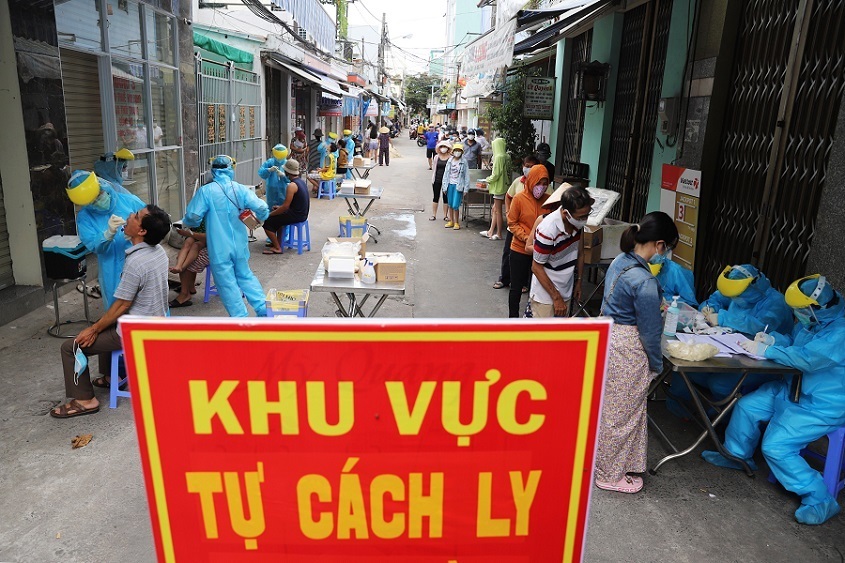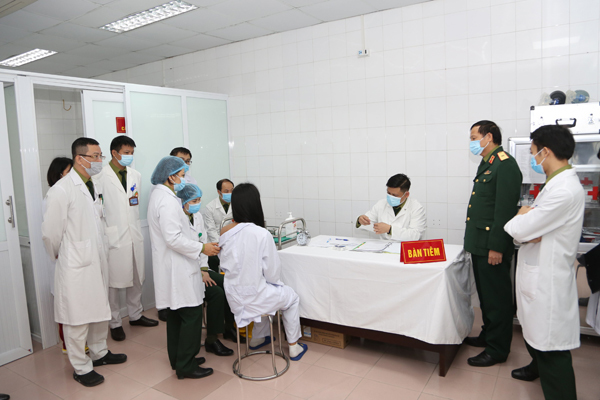Touched by the spirit of "fighting epidemic like fighting enemy"
For decades, the Universal Declaration of Human Rights (UDHR, 1948) and two conventions - the Convention on Civil and Political Rights (ICCPR, 1966) and the Convention on Economic, Social and Cultural Rights (ICESCR, 1966) became the backbone of the International Human Rights Code.
Vietnam became a member of the United Nations in 1977 and acceded to the other two conventions in 1982.
In which, Article 12 of ICESCR is considered as the most comprehensive international law on the right to health care. Accordingly, everyone has the right to the highest possible standard of physical and mental health.
Member states to the Convention should take measures to fully exercise this right.
On the principle of protecting human rights, the Party and State of Vietnam always define people as both the goal and the driving force of the cause of national construction; people are at the center of socio-economic policies; promoting and protecting human rights is an important factor for sustainable development, ensuring the success of the industrialization and modernization of the country.

Vietnam takes large-scale samples for Covid-19 vaccine test
In the field of health, Article 38 of the 2013 Constitution also states: Everyone has the right to health protection and care, equality in the use of medical services and the obligation to comply with regulations about disease prevention, medical examination and treatment. Any acts threatening the life or health of others and the community are strictly prohibited.
In 2017, Resolution No. 20-NQ/TW of the 12th Party Central Committee continued to emphasize 5 viewpoints, 9 tasks and solutions to enhance the protection, care and improvement of the people's health in the new situation. In particular, emphasis must be made to ensure that the health of all people is managed and cared for.
With the health system spreading from the central to local levels, for many years, Vietnam has done well in preventing epidemics, preventing and improving the health of the people, even in periods of extremely economic difficulties.
In 2020, when the Covid-19 epidemic broke out globally, seriously affecting all aspects of life, Vietnam became a bright spot for low-cost but effective anti-epidemic, positive economic growth, human development index keeping increase.
From the beginning, Vietnam fully grasped the spirit of "fighting epidemic like fighting enemy", the Government resolutely implemented many synchronous and flexible solutions from preventing, detecting, isolating, localizing, suppressing epidemic to treatment.
In a message to the online conference of Health Ministers in the Western Pacific region on April 8, Prime Minister Nguyen Xuan Phuc emphasized that the Vietnamese Government always determines that economic losses may be accepted to protect people's lives and health, not letting anyone behind.
So far, Vietnam has been well controlling the Covid-19 epidemic. At the online conference on Covid-19 epidemic prevention on December 23, Dr. Kidong Park, Chief Representative of the World Health Organization (WHO) assessed that Vietnam's anti-epidemic success was not an overnight success but that success had been achieved through years of preparation.
Find ways for people to live safely

The first volunteers got a trial shot of the Nanocovax Covid-19 vaccine
Along with maintaining anti-epidemic measures, Health Minister Nguyen Thanh Long said that Vietnam determined that without Covid-19 vaccine, life would not be able to return to normal. The Ministry of Health has actively implemented research and production of Covid-19 vaccines in the country as well as increasing access to vaccine sources in the world.
"Vietnam wants to be able to use Covid-19 vaccine for the entire Vietnamese people," said the Minister of Health.
With external sources of vaccines, Vietnam is one of 92 countries participating in the global access to Covid-19 vaccine program with committed support from GAVI COVAX ACM. Accordingly, this organization will provide free vaccines to 20% of the population of the member countries.
In addition, Vietnam is studying and ordering vaccines from Russia, the UK and the US. It is expected that by the end of the first quarter of 2021, the first doses of vaccine may be available.
In the country, right after the outbreak of Covid-19, the Ministry of Health has directed domestic manufacturers to increase research and production of Covid-19 vaccines.
Four Covid-19 vaccine research units, including: Institute of Vaccines and Medical Biologicals (Ivac); Vaccine and Biological Products One Member Company Limited (Vabiotech); Research Center for Vaccines and Medical Biologicals (Polyvac) and Pharmaceutical Biotechnology Co., Ltd. (Nanogen) have been actively researching vaccines for more than half a year, using the latest technologies.
On December 17, Nanogen officially implemented the first phase trial of Nanocovax vaccine produced by the company based on recombinant protein technology on human, making Vietnam one of 42 countries in the world can produce vaccines.
Initially, more than 20 volunteers who were injected with the vaccine have stable health. If the clinical trial goes well, by the end of 2021, Vietnam will have full clinical research data of this vaccine to apply for the registration number for circulation.
 |
|
Preparing to vaccinate made-in-Vietnam COVID-19 with a dose of 50mcg for volunteers.
|
In addition to Nanogen, two other units, Ivac and Vabiotech, will begin clinical trials in March 2021.
According to the Ministry of Health, the average time to study a vaccine takes 7-12 years, but in a pandemic situation like Covid-19, all countries allow shortening administrative procedures, however requirements on engineering, technology, science, safety must be absolutely guaranteed.
Deputy Prime Minister Vu Duc Dam affirmed that successful vaccine research is not only the pride of the scientific community and the Vietnamese health sector, but it is indeed an effective anti-epidemic tool. In the context that the price of vaccines in the world is quite high and the supply is limited, it is extremely necessary to promote vaccine research in the country.
Nanogen has announced that the price of finished Nanocovax vaccine is only about 120,000 VND per dose, while the common price of major pharmaceutical companies in the world ranges from 300,000 - 1.6 million VND a dose.
Therefore, Vietnamese people are placing hope on domestically produced vaccine with high safety, low cost, and easy access to everyone.
In the difficult conditions of the country, Vietnam has both strongly implemented anti-epidemic activities, while finding ways to approach vaccine sources in the world for the highest purpose, ensuring that every citizen has comprehensive health care.
Thuy Hanh